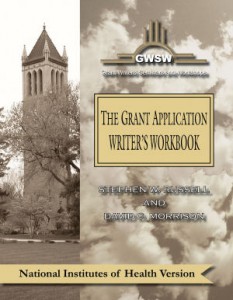Fuzzy Language Reflects Fuzzy Thinking
Over the past several months, as a regular component of our weekly blog, we have been discussing the inappropriate usage of various English language words in grant applications. In many cases, such inappropriate usage can present concerns among reviewers as to what exactly is meant by the applicant. Any introduction of incorrect usage of the English language in the mind of the reviewer could, at least potentially, lead to reduced levels of enthusiasm and, as a consequence, reduce the probability of funding of the application. Earlier, we discussed problems with the use of “if” and “whether” (04-11-16), the use of “understand” or “understanding” (05-12-16) and the use of the phrase “to the best of our knowledge” (07-07-16). In today’s blog post, we’ll discuss the use of the word “research” and its inappropriate usage in grant applications.
While it is highly likely that readers of this blog post already know, and have a pretty good sense for what research is (with many readers currently being actively engaged in such), it would nevertheless be instructive to consider the formal definitions. According to the definition provided by the Merriam-Webster Dictionary, there are three formal definitions of “research”, specifically:
1) a careful or diligent search;
2) a studious inquiry or examination (especially investigation or experimentation aimed at the discovery and interpretation of facts, revision of accepted theories or laws in the light of new facts or practical application of such new or revised theories or laws);
3) the collecting of information about a particular subject.
It is our considered opinion that most readers would not be in disagreement with these definitions; however, it should be noted that what each of these definitions actually describes an activity (frequently called a “scholarly activity”). Namely, when distilled down to its essence, research is simply a study, an inquiry or examination, or an act of collecting information. All of these describe activities, nothing more.
Unfortunately, while these definitions are relatively straightforward, it is amazing the number of times that an actual discovery attribute is ascribed to the research activity in grant applications. Probably among the most commonly used (~40-50% of all applications we see) is the argument that: “Recent research has shown that……..” or: “New research has begun to illustrate that……” or: “Over the past decade, research has examined the key factors responsible for…” In each of these examples (and there are likely to be dozens of additional examples), a finding (or end result of the research activities) has been attributed to the research activity itself. It should be readily apparent that research, per se, will NEVER be able to show (or illustrate or examine) things. Since activities cannot show things, it follows naturally that research itself cannot show things. Of course, it could be used to argue that the researcher himself/herself has been very busy.
The purpose of undertaking research activities is, almost always, to generate new knowledge. Thus, it is always the results of the research activities (i.e., the new knowledge) that can provide the evidence in support of some concept or idea. Thus, the appropriate language should be: “Recent research findings have provided strong evidence that……”, or perhaps: “Results of recent research have provided additional evidence in support of…….”. It should be apparent to most astute readers that the concept of inappropriate attributing of findings to the research itself can be readily extrapolated to other words frequently used in place of “research”. In this respect, “studies” cannot show things (however, the results of studies can provide evidence for), nor can “investigations” or “examinations”. Similar to “research” each of these words describes an activity.
Skeptics might argue that erroneously attributing results to the research itself would not be a primary focus for most reviewers. In other words, “Who cares whether the term “research” is used correctly or not? After all, this is a grant application, not a scholarly document.” We will acknowledge that attention to this kind of detail regarding the appropriate usage of the term “research” in your grant application (or any other proper usage of the English language) may not be a “deal breaker” to most reviewers. However, it can also be convincingly argued, as Andreas Johannson, a Swedish journalist/writer has done in a scholarly article, “Thinking and Communicating with Clarity and Precision“, that “Language and thinking are closely entwined. Like either side of a coin, they are inseparable.” He further points out that: “Intelligent people strive to communicate accurately in both written and oral form, taking care to use precise language, defining terms, using correct names and universal labels and analogies.” In this latter respect, remember that, as Johannson has so clearly pointed out: “When you hear (read) fuzzy language, it is a reflection of fuzzy thinking.”!

